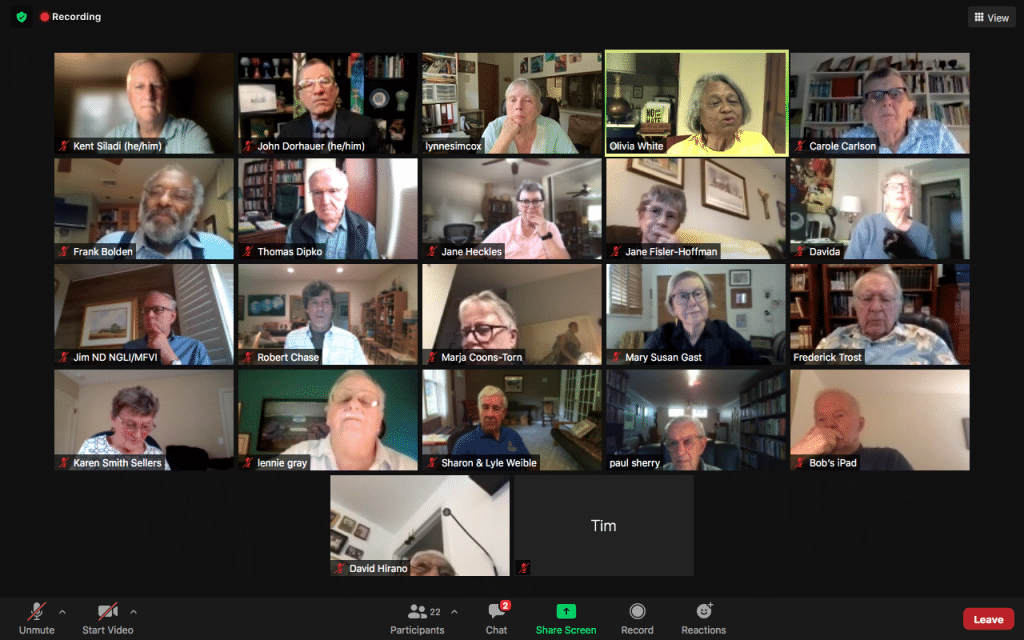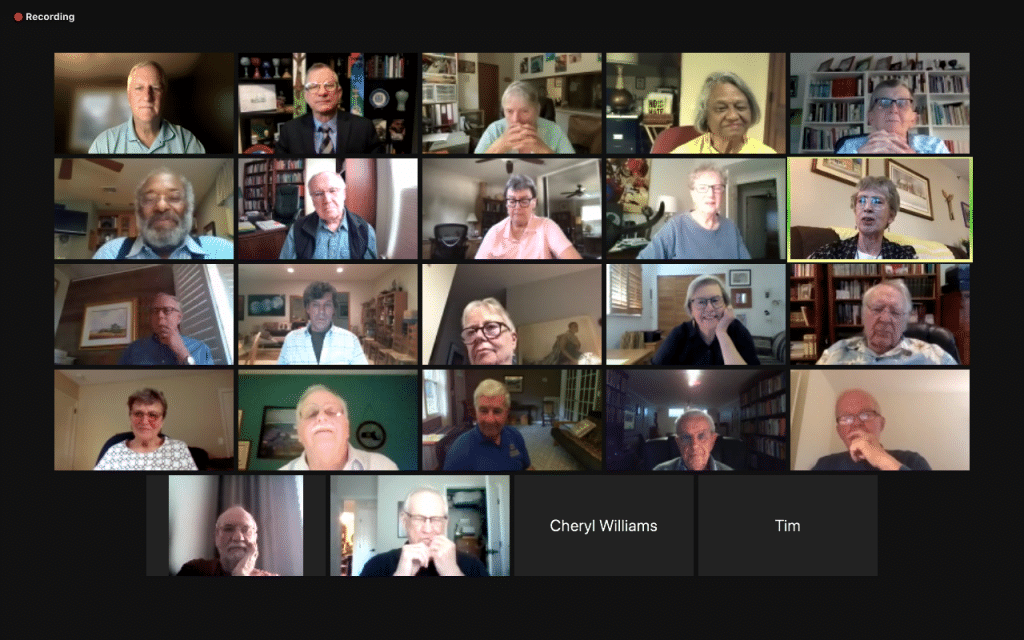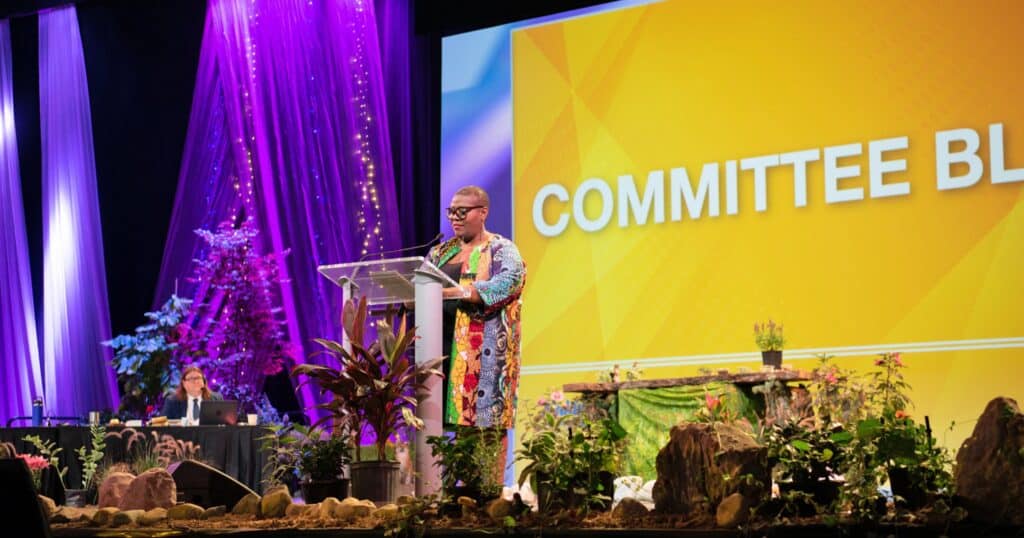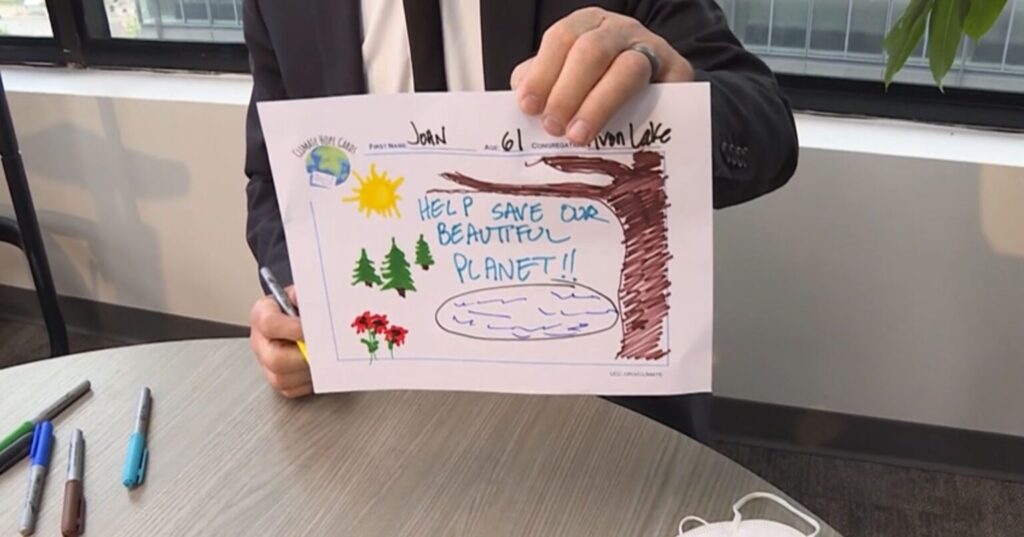Former UCC national staff and Conference ministers reminisce on Zoom
They spoke about significant moments from previous General Synods.
Forcing a Boston eatery to open for women at lunch in 1969.
Standing with Coachella farmworkers in 1973.
Celebrating full communion (Kirchengemeinschaft) with church leaders from East Germany and West Germany in 1981.
Supporting inclusive language in 1989.
Endorsing marriage equality in 2005.
They reminisced over old friends and colleagues. Remembered mentors who have passed. Faces gone from the scene. Noted new faces, young faces and diverse faces, ready to lead their beloved church into the future.

United Church of Christ General Minister and President John Dorhauer and the Rev. Kent Siladi, UCC director of philanthropy, hosted almost 20 former national church executives and conference ministers on Zoom Tuesday night. Each one was asked each to respond to the same question: What moment at General Synod that you can recall or were a part of had a profound impact on the future of the UCC?
‘Those who came before us’
“One of the burdens of this office and one of the joys of this office is living up to the expectations of those who came before us,” Dorhauer said. “I see in every one of you a style of leadership and a commitment to the Gospel I will spend the rest of my days trying to emulate.”
The gathering, he said, was to honor their service but also to “hear the stories of what it was that built this denomination into what it is today. What it is we’ve inherited that we bear responsibility to hand over to another generation of leaders.”
“We are something that the Holy Spirit wanted to give birth to,” Dorhauer continued. “And in faithful partnership with the Holy Spirit, we have held true to our calling and steadfastly maintained the work of the Gospel that we promised to undertake.”
‘What happens at the edges’
The Rev. Jane Heckles, former Conference minister, Southern California Nevada Conference, recalled the impact of the 2003 “God Is Still Speaking” initiative. “It was a deep commitment to evangelism in a very different way than had ever been done,” she said. “And we got on the same page about de-centering ourselves and understanding that we were no longer at the center of the universe.
“Evangelism meant welcoming people from all kinds of places and lives.”
The Rev. Davida Crabtree, who led several Conferences, recalled the 7th General Synod (Boston, 1969) where she was working on the early editions of the Balaam’s Ass newsletter, later titled Balaam’s Courier. She also noted her experience with opening the nearby lunch counter to women, observing, “The most important work of Synod does not happen in the hall but at the edges.”
The Rev. Thomas Dipko, who led what was then the Ohio Conference and then became executive director of the United Church Board for Homeland Ministries — a predecessor of Justice and Local Church Ministries — helped shepherd The New Century Hymnal through various Synod approvals in the 1980s and 1990s. “Synods are at their best when Synods are remembering the scriptural and ecumenical creed foundations of the church and always and again the necessity from those sources to keep together the worship life of the church and the prophetic life of the church.”
‘Quality of the people’
Many observed the changing role of technology, not only in how Synod operates and is presented to delegates and visitors, but how technology has quickened the distribution of actions of the Synod. But even new technology has not yet solved an ongoing issue facing information from Synod.
The Rev. Mary Susan Gast, who led the Coordinating Center for Women and the Northern California Nevada Conference, noted, “We do great theological work at General Synod. But how do we get it out to the wider church? How do we hear in our different settings of the church the great theological work that is going in many of the settings?”
Former UCC President Paul Sherry has been to every General Synod since 1965. “As I listen to all of you, I am reminded so much of the remarkable things that have happened to the life of this church. The quality of the people involved and the commitment of all of you – all of us – to try to build through this church a society of all people, of love, justice and mercy. Those memories have stuck with me all my life.”
The Rev. Robert Witham, who served both in Conference ministry and on the national staff, gave a light warning about nostalgia. “It’s okay to look back,” he said. “But don’t stare.”
Tim Kershner, a longtime General Synod Newsroom volunteer, lives in Campton, N.H., in the New Hampshire Conference.
Related News
‘On My Mind Today’ shares thoughts and concerns from UCC’s Karen Georgia Thompson
In a rapidly changing and volatile world — where the latest news raises more questions...
Read MoreSelf-nominations requested for individuals to serve as General Synod committee chairs
As planning for General Synod is well underway, the General Synod staff are seeking...
Read MoreValentine’s Day was a great time to have a heart for the climate: UCC churches take action
The United Church of Christ Environmental Justice ministries recently invited congregations to...
Read More


